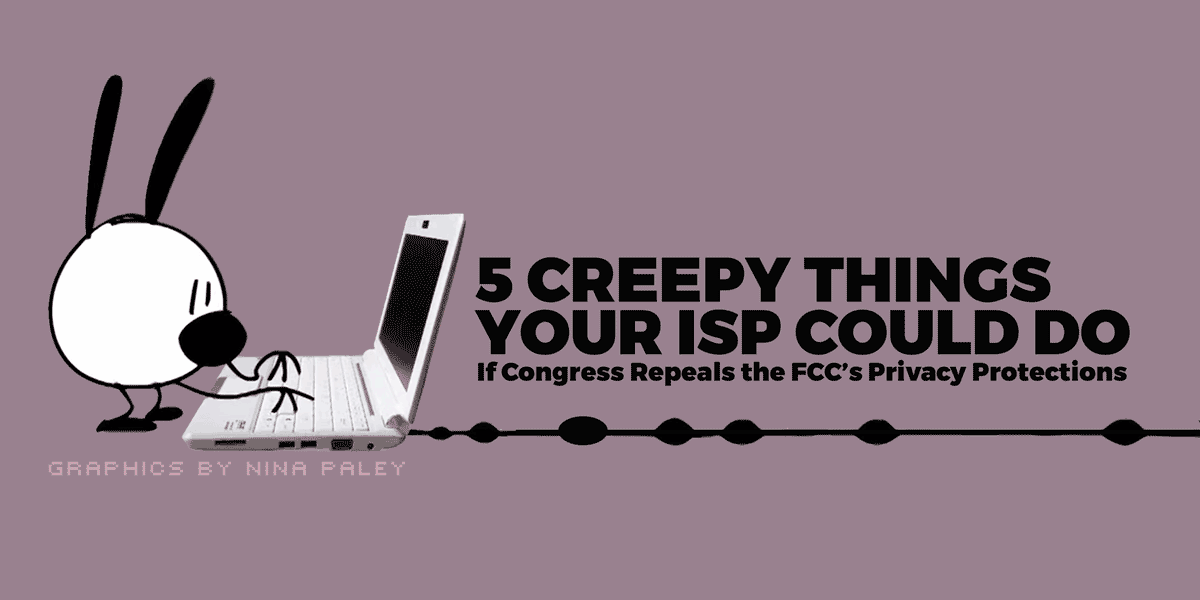Your personal data will now be up for sale
In a vote that pretty much fell along party lines, the United States House voted on Tuesday to repeal an FCC rule that prevented your Internet service provider from selling your personal data to marketers. In what can only be described as a privacy nightmare, companies like Comcast, Cox, AT&T and others will now be able to offer marketers information including your browsing habits and other customer data they collect and hold about you and your family. The resolution now heads to President Trump's desk where it is expected that he will sign it and, by doing so, abolish Internet privacy for most average users.
Who voted for this thing?
As expected, the 215-205 vote fell pretty much along party lines with Republicans overwhelming voting for the resolution and Democrats voting against. For a list of how specific Representatives, voted, you can go here. If your Representative voted for this bill, perhaps it's worth giving their office a call to remind them that you both value your privacy and that you vote.
What kind of stuff could my ISP do with my data?
Selling your data to marketers is the obvious moneymaker here for service providers. But the value of the data they provide (the price they can charge marketers) increases with the amount and details of that data. So ISP's are likely to engage in some pretty creepy behaviors to gather the most detailed information about you that they can. The Electronic Frontier Foundation created the handy graphic below to show 5 super creepy ways your ISP could use their new data gathering freedom.
What can I do to protect my data from snoopers and marketers?
Remember that everything that goes through your Internet connection is seen by your ISP. That means that using encryption has now become more important than ever. By making sure you use the secure version of any websites you visit (hint: the URL starts with 'https' instead of 'http'), you can prevent some of the easiest forms of data gathering by your ISP. They will be able to see that you visited a site but they won't know anything you did while you were there.
Going one step further, you might want to consider using a virtual private network (VPN) provider all the time. VPN's wrap all of your Internet traffic in an encrypted tunnel and effectively prevent your ISP from even knowing which sites you visit. Of course, the VPN provider still knows where you go so, if you're concerned about your privacy, choose your VPN wisely. Preferably, look for providers that don't keep logs and are outside of the United States. Also, avoid free VPN's as they are most likely to offer their services free by monetizing (selling) customer data.
For the most privacy protection, download and use the Tor Browser Bundle for all of your web surfing needs. Tor not only protects your browsing information from your own ISP but also allows you to visit any website completely anonymously. The software, which is based on the Firefox web browser, is available for free download from the Tor Project homepage. If you decide to go this route, you need to consider it carefully as there are performance trade-offs when using Tor. Even on fast Internet connections, your browsing will be slower as your traffic is routed through multiple other computer systems on the Internet. Additionally, Tor only works for web browsing by default. If you want to protect other things like email, instant messaging, and the like, you'll need to spend some time configuring those applications to use Tor. It's not difficult, but going this way might require a little time, patience, and learning.
What can we do now?
Right now, the future of this legislation is completely within President Trump's hands. If he signs is, which he is expected to do, it becomes law. Thankfully, the President seems to be very sensitive to public opinion and he might be able to be swayed if we take the next few days to call and write him expressing our opposition to this move. You can reach the White House directly by calling 202-456-1414 and asking for the comment line.
Final thoughts
As more and more of us turn to the Internet for information on some of the most intimate parts of our lives, being able to rely on our service providers to protect our privacy is more vital now than ever before. Legislation like this erode the very fabric of trust that we've worked so hard to establish with our providers. Our Internet connections should, for the most part, be 'dumb pipes', shuffling data to and from various places on our behalf. If this legislation passes the President, marketers will suddenly have unprecedented access to our personal lives and information that should be completely under our control. The deal we made with our ISP's when we signed up was not to pay a monthly fee to subsidize their marketing program but to pay a monthly fee for Internet access. Changing the rules mid-game is both unfair and completely unethical.
Lastly, the Senators and Representatives who supported this legislation need to be punished. They should pay a heavy political price for selling our privacy out from under us. There will be an election next year and you should remember and appropriately 'thank' them for their betrayal the next time you're in the voting booth. Our legislators must understand that they have a simple choice to make when it comes to loyalty: they are either loyal to us, the people who elected them, or they are loyal to special interests who fun them. Those two demographics are in complete opposition to each other and they cannot serve both. When they choose the wrong side, they must be made to pay and the cost needs to be their political careers.
Maybe then, they'll start to listen to the people once again.
